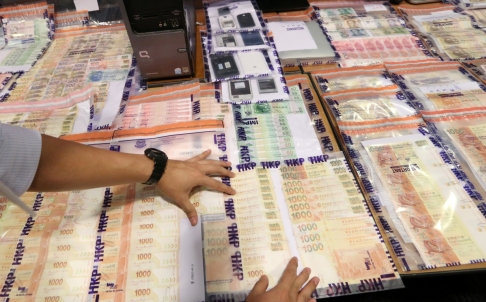One officer for every 740 cases
8-2-2015

■Only 50 investigators are assigned to the police anti-money laundering unit
Just 50 investigators in unit tracking suspicious cash flows despite more than 37,000 potential inquiries as exodus to private sector hits hard
Only 50 investigators are assigned to the police anti-money laundering unit that faced a record deluge of more than 37,000 potential cases last year.
The disclosure comes as questions are being raised by lawmakers about the unit’s ability to assess complex money-laundering cases given an exodus of experienced investigators to the private sector.
The Joint Financial Intelligence Unit (JFIU), which is staffed by police and customs officers, is responsible for assessing all of the city’s suspicious transaction reports.
Cases it believes deserve further investigation are forwarded to the appropriate agency, which can involve the police, customs, the Independent Commission against Corruption or overseas financial intelligence units.
At the most recent meeting of the Legislative Council’s security panel last Tuesday, pan-democratic lawmaker Kenneth Leung, who represents the accountancy sector, questioned the unit’s capabilities to the ICAC’s director of operations Ryan Wong Sai-chiu.
“In recent years, we’ve seen an increase in money-laundering activities,” he said, during which time, the JFIU had lost staff to the business sector lured by better pay and work conditions.
Wong admitted that in recent years, the anti-graft watchdog had lost some of its most senior staff.
“We’ve seen experienced colleagues leave the ICAC, especially those who worked in compliance,” Wong told the panel.
In the past three years, the number of suspicious transaction reports received by the unit has increased more than 80 per cent – from 20,287 reports in 2011 to 37,188 in 2014.
During this period, the number of people convicted of money laundering has dropped from 246 in 2011 to 151 in 2014.
Of the 32,907 reports received in 2013, about one in four – 8,037 – were deemed potential cases of money laundering and passed on to other authorities for further investigation.
The police received the bulk of these referred cases – 62 per cent – with customs handling about 34 per cent. The remaining cases went to ICAC or overseas financial intelligence units. These figures for 2014 have not yet been released.
A police spokesman said there were no “specific requirements as to the qualifications” for an officer to work in the JFIU, “but they must have a good record of service”.
“Both officers of the police force and the customs and excise department who are interested in the work of the JFIU may apply to join,” the spokesman added. “Officers newly posted to JFIU will undergo training and coaching by experienced officers.”
In its 2013 annual report, the head of the unit, superintendent Cyril Mak Wing-yip, stated that “to better handle the anticipated volume of suspicious transaction reports (STR) in the months to come, the JFIU has been fine-tuning the overall STR analysis workflow”. He did not explain the improvements.
Since August 2013, the unit has also doubled the size of four financial investigation classes it runs every year for the police force from 50 to 100 students. In 2013, 291 officers took the class.



